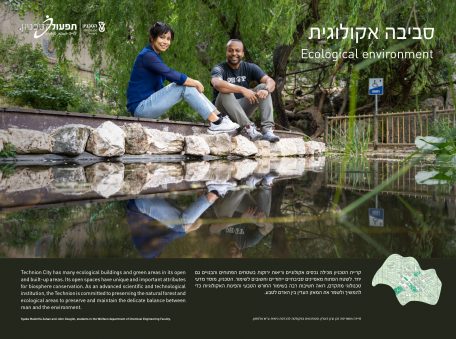The garden spans an area of about 20 dunams of the Technion Campus near the Faculty of Civil and Environmental Engineering. The landscape of the garden combines a natural Mediterranean forest, a planted pine forest, gardens representing different Israeli habitats, an orchard of fruit trees and ponds. The garden at the Technion is a unique gem in the center of the bustling complex, both scientifically and visually, and contains a wide variety of unique and diverse plant species, the likes of which are rare to find in our districts. The garden serves as an educational research laboratory for students and teachers at the Technion, but can contribute a lot to every person. The garden as an active and thriving part of the Technion is necessary and makes it possible to create a mutual-existential system between man, technology and nature.
The experience of touring the garden is a magical one, the ability to allow the many students and faculty members at the Technion to come directly to nature within walking distance of the classroom / office is a great privilege that is sometimes taken for granted, this creation called the Ecological Garden at the Technion.
The Faculty of Civil and Environmental Engineering emphasizes that the Ecological Garden has three main goals: research, education and promotion of environmental technologies. When part of its goals is dedicated to creating a dialogue with the environment and the community, to serve as a source of theoretical and practical knowledge and to combine ecological abilities and skills with a respectful attitude to the environment, the garden is also a field laboratory for ecological experiments and a link between the students and the various faculties.
The Garden’s vision is to serve as a site for environmental and cultural inspiration, “everyone who passes through it knows that it is possible to do things differently”. The garden serves as a living museum for about 650 cultured and wild species of Israel, among them about 50 red species (in danger of extinction), in a variety of habitats: moist habitats, the kurkar, the northern valleys, the seashore, the desert, Hamra land from the Sharon and more. In addition, the garden is used as a nucleus for the propagation of plants such as: the Israeli Vicia, a red plant in danger of global extinction, for the purpose of a future settlement project in the springs of the Emek Yizrael.
The garden is visited every year by: kindergarten, elementary school, and high school students, students of ecology and botany courses, students of environmental engineering, urban and landscape architecture, teachers, horticulturists, retirees and more, who get to know plants, be exposed to the concepts of agriculture, botany, nature conservation, recycling, sustainability, runoff conservation planning, environmentally friendly gardening, knowledge of issues with invasive species, species in danger of extinction, species conservation and restoration of extinct species and more. The tutorials enable a learning experience different from the routine school experience, an activity in which the students research on their own.
Vision
The purpose of the garden is to establish a social-green hub centering activities on environmental issues / green energy / green campus and utilizing existing resources with minimal damage to the environment. To serve as an external research laboratory in which studies on plant, soil, water and energy issues will be carried out. Experience an extracurricular learning experience. To serve as a place for the conservation of wild plants and cultivated plants and education for botany. To be used as a place for entertainment and leisure for visitors and guests.
Garden Team:
Hanoch Rapoport – Garden Director since 2014, master’s degree in Land of Israel studies and tour guide
Oren Azari – Garden Agronomist since 2012, bachelor’s degree in plant sciences in agriculture and a master’s degree in natural and environmental resource management
Bosemet Segal – Garden Curator and Botanist since 2012, with a bachelor’s degree in biology and a master’s degree in agricultural engineering sciences, specializing in plant ecology
Despite the difficult situation of a lack of water in the garden and in the whole country, the garden continues to flourish mainly due to its being mainly based on the Carmel flora that is adapted to the environment. There are many activities in the garden, training for the student community on sustainability issues once a month, tours for guests and apprentices on environmental issues and gardeners in the use of wild plants in combination with the ornamental garden.
The Ecological Garden has been recognized as a botanical garden declared by the State of Israel and as such must meet the most stringent conditions of collecting data, signage and instruction.




